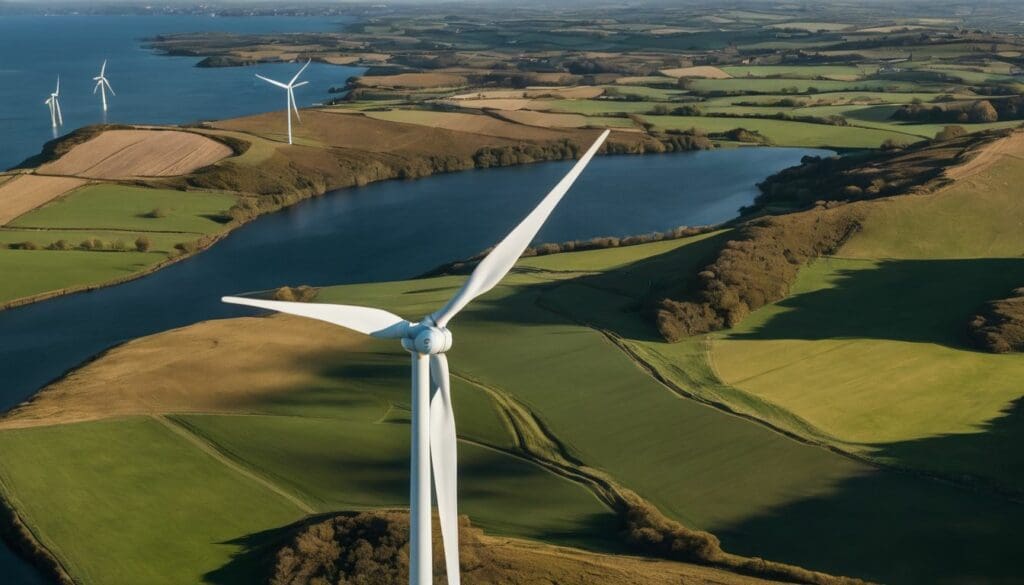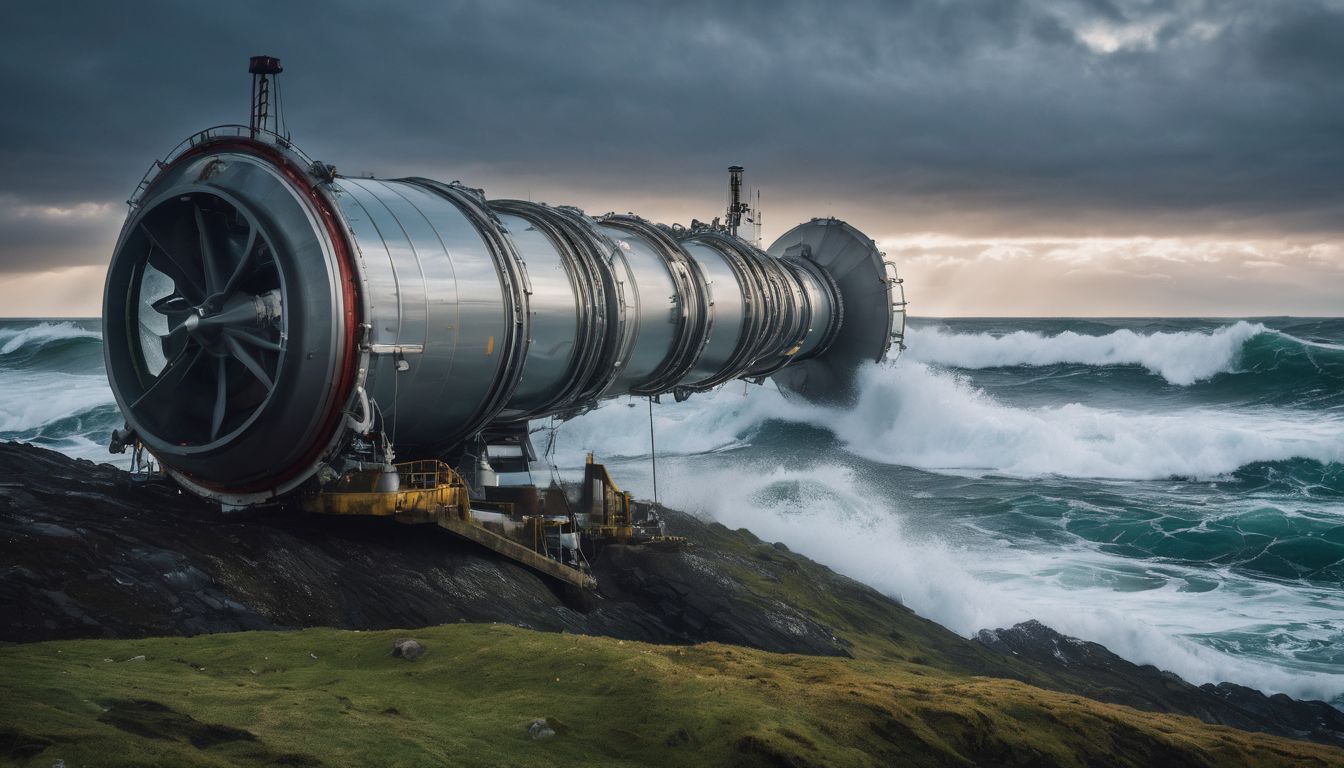Navigating energy bills has become a tougher challenge post-Brexit. The UK’s exit from the EU rewrote many rules that once shaped our energy landscape. This article will delve into the effects of Brexit on UK energy policy, exploring how it impacts everything from your monthly bill to national climate targets.
Stay tuned for insights that matter to you and the planet!
Key Takeaways
- Brexit demands the UK to re – evaluate energy policies, particularly in securing gas supplies and potentially increasing LNG imports. This could lead to a diversification of sources but may also influence gas prices and environmental goals.
- The transition post – Brexit affects funding for renewable energy initiatives, with the UK losing EU financial support. This necessitates finding alternative investment routes to maintain progress towards sustainable energy targets.
- Changes in state aid rules, nuclear sector regulations, and environmental standards for fossil fuel projects will be instrumental as the UK aims to achieve its net zero carbon emissions objectives while fostering innovation in its energy sector.
- Multi – national companies operating in the North Sea must adapt their strategies due to potential shifts in operational costs and regulatory uncertainties following Brexit’s impact on gas markets.
- Ensuring continued collaboration with EU countries remains crucial for maintaining energy security. The UK must navigate complex renegotiations around market access, interconnectors, trade agreements, and cooperative research efforts post-Brexit.
Background: The Relationship Between the UK and EU in Energy Policy
The relationship between the UK and EU in energy policy has been regulated by principle documents such as the Internal Energy Market, which the UK was a member of. However, Brexit has raised questions about the future of this relationship and its impact on energy policy.
Principle documents regulating the relationship
Before Brexit, key documents laid the foundation for the UK’s energy policy within the EU framework. These included regulations and directives that allowed smooth trade, investment, and collaboration in areas like renewable energy, efficiency improvements, and secure supply chains.
The Third Energy Package was particularly significant; it governed how electricity and gas markets operated across Europe to promote a competitive environment while pushing towards lower emissions.
Another critical piece of legislation was the Euratom Treaty which provided a basis for developing safe nuclear power—a major component of low carbon energy policies. Cross-border connections between countries were facilitated by guidelines that ensured fair access to networks—an important aspect for maintaining energy security and supporting sustainable energy initiatives across member states.
With these instruments now obsolete post-Brexit, determining alternatives is vital for maintaining robust UK-EU energy relations while upholding commitments to net-zero targets.
UK’s membership in the Internal Energy Market
The UK’s membership in the Internal Energy Market was a key aspect of its energy policy as part of the EU. This allowed for the free flow of electricity and gas across borders, contributing to energy security and market efficiency.
The Internal Energy Market aimed to harmonise energy trading regulations, promote competition, and diversify energy sources – vital for achieving sustainable, renewable energy goals.
The UK’s participation in the Internal Energy Market also facilitated coordination on cross-border infrastructure projects such as interconnectors with neighbouring countries. These interconnectors enhanced energy supply resilience by allowing the sharing of surplus power during peak demand periods.
Impact of Brexit on Interconnectors and Market Abuse Regulations
Brexit has impacted interconnectors between the UK and EU, potentially affecting energy trading and supply. Market abuse regulations are also subject to change, influencing the fair practice and transparency within the energy market.
These alterations may have implications for how energy is sourced and distributed in the UK. Moreover, it could impact how energy pricing is regulated moving forward.
Brexit’s impact on interconnectors has raised concerns about maintaining a stable and efficient energy supply across borders while upholding market integrity. The shift in regulations governing market abuse seeks to preserve a fair competitive environment within the energy sector as the UK adapts to new trading dynamics post-Brexit.
Effect of Brexit on State Aid Rules, Nuclear Power, and Climate Change Goals
Brexit will impact the State Aid rules for energy infrastructure and support schemes, potentially affecting the level of government support for renewable energy projects. The UK’s nuclear power sector may also face implications as it seeks to meet climate change goals without the influence of EU regulations.
State aid rules for energy infrastructure and support schemes
State aid rules for energy infrastructure and support schemes are set to undergo significant changes post-Brexit. These regulations have historically played a crucial role in supporting renewable energy projects and fostering innovation in the UK’s energy sector.
After Brexit, the UK will have the opportunity to establish its own state aid framework tailored to prioritise sustainable and low-carbon energy initiatives, steering away from EU oversight.
This shift could potentially provide more flexibility in funding new energy infrastructure projects and bolstering support for emerging technologies, contributing towards achieving net zero carbon targets.
Furthermore, redefining state aid rules presents an opportunity for the UK government to streamline processes for granting financial assistance to energy ventures that align with environmental objectives.
Implications for the nuclear power sector
Brexit has the potential to significantly impact the UK’s nuclear power sector. The withdrawal from Euratom could lead to delays in the development and deployment of new nuclear power plants, as well as impact existing operations.
Additionally, Brexit may affect the supply chain for nuclear technology and materials, potentially leading to increased costs and project timelines. Furthermore, changes in regulatory frameworks post-Brexit could create uncertainty for investment in the nuclear sector.
The UK’s departure from the EU also raises questions about its future participation in collaborative research and development initiatives related to nuclear energy. This could influence innovation and technological advancements within the industry.
Effects on UK’s climate change and emission reduction ambitions
While Brexit has implications for the nuclear power sector, it also affects the UK’s climate change and emission reduction ambitions. The departure from the EU may impact the country’s ability to meet its climate targets and emissions reductions commitments.
This shift could create challenges in aligning with European environmental policies as well as potential disruptions in collaborative efforts towards sustainable energy practices. Furthermore, Brexit might influence the UK’s access to funding and resources necessary for achieving net-zero carbon energy goals post-Brexit, potentially altering the landscape of sustainable energy in the nation.
With possible complications arising from diverging regulations and standards between the UK and EU, securing a smooth transition towards achieving climate change goals becomes increasingly important.
Implications for Renewable and Low Carbon Energy Policy
Brexit will impact the UK’s renewable and low carbon energy policies, affecting environmental standards for fossil fuel projects and funding from EU institutions. To find out more about how Brexit will shape the sustainable energy landscape in the UK post-Brexit, keep reading!
Changes to environmental standards for fossil fuel projects
Environmental standards for fossil fuel projects are undergoing changes post-Brexit, impacting the UK’s push towards sustainability. These modifications influence regulations related to emissions, pollution control, and ecological conservation tied to the extraction and utilisation of fossil fuels.
The alterations could determine the environmental impact of future energy endeavours in the UK, shaping the nation’s commitment to sustainable practices, resource conservation, and emission reduction.
With Brexit restructuring energy policies, fossil fuel projects will face new environmental standards. These adjustments entail regulations governing air and water quality, wildlife protection measures, and carbon capture initiatives within the fossil fuel industry domain.
Impact on funding from EU institutions
The UK’s energy sector has heavily relied on funding from EU institutions to support its transition to sustainable and low carbon energy policies. Post-Brexit, the impact on this funding is significant, potentially affecting vital projects aimed at achieving net zero carbon goals.
Without access to EU funds, the UK may face challenges in implementing renewable energy initiatives and meeting climate change targets. This shift necessitates a revaluation of funding sources to ensure continued progress towards a greener and more environmentally sensitive energy landscape.
EU institutions have played a crucial role in providing financial support for renewable and low carbon energy projects within the UK. The absence of such funding opportunities post-Brexit will compel the nation to explore alternative mechanisms that align with its long-term environmental objectives.
Potential Effects on Energy Prices, Gas Market, and Multi-National Operations
Brexit may lead to changes in gas sourcing, potentially increasing LNG imports and impacting gas prices, as well as affecting the operations of multi-nationals in the North Sea. Read more about the potential effects of Brexit on UK energy policy to stay informed about sustainable energy post-Brexit.
Changes in sourcing gas and potential for increased LNG imports
Brexit is leading to changes in how the UK sources gas and could result in increased LNG imports. This impacts the country’s energy market and environmental goals.
- Diversification of Gas Sources: The UK will look towards a more diverse range of suppliers, reducing reliance on specific regions for gas imports.
- Increased LNG Imports: Greater reliance on liquefied natural gas (LNG) from global markets may lead to enhanced flexibility in sourcing energy.
- Shift in Market Dynamics: The change in sourcing could impact pricing and competition within the UK energy market, influencing both consumers and businesses.
- Environmental Considerations: Importing LNG may raise questions about its carbon footprint, potentially affecting the country’s commitment to net zero carbon energy policies.
- Supply Chain Implications: Changes in sourcing have implications for infrastructure development, storage facilities, and transportation networks supporting the delivery of gas across the UK.
- Energy Security Concerns: A shift towards increased LNG imports could raise discussions about security of supply and resilience in a rapidly changing global energy landscape.
- Regulatory Adaptation: With changes in sourcing dynamics come potential shifts in regulatory oversight to ensure continued adherence to environmental standards and sustainable practices.
Impact on gas prices
As a result of changes in sourcing gas and the potential for increased LNG imports, the impact on gas prices could be significant. The uncertainty surrounding Brexit has already led to fluctuations in gas prices, which may continue as trade agreements and market dynamics evolve post-Brexit.
These changes could lead to both challenges and opportunities for the UK energy sector, affecting businesses and consumers alike.
Effects on operations of multi-nationals in the North Sea
The impact of Brexit on gas prices will also have significant effects on operations of multi-nationals in the North Sea. Changes in sourcing gas and potential for increased LNG imports may lead to shifts in operational strategies for companies operating in the region.
Additionally, uncertainty surrounding energy market regulations post-Brexit could influence investment decisions and business planning for multi-national corporations with interests in North Sea energy operations.
These changes could significantly affect the way multi-nationals conduct their activities, potentially influencing supply chain management, production processes, and overall operational costs.
Conclusion
In conclusion, Brexit has far-reaching implications for the UK’s energy policy. The severance from EU regulations will necessitate a reorientation of the country’s energy strategy.
Market interconnection, state aid rules, renewable energy support, and nuclear power development are among the key areas affected by Brexit. As the UK navigates this new landscape, sustainable and efficient solutions will be pivotal in shaping its future energy independence and environmental commitments.
FAQs
1. How has Brexit impacted UK energy policy?
Brexit has led to major changes in how the UK deals with energy efficiency, regulation, and its quest for energy independence from European Union policies.
2. Is there an energy crisis in the UK because of Brexit?
Yes, Brexit has influenced the energy market relationship between the UK and EU, contributing to challenges that could intensify an energy crisis within the country.
3. Will Brexit affect sustainable and net-zero carbon energy policies in the UK?
Brexit implications mean that the UK now shapes its own sustainable energy strategies aiming for net-zero carbon without direct EU influence.
4. How does EU-UK trade look after Brexit when it comes to energy?
Post-Brexit, trading related to energy between EU-UK requires new agreements; this affects interconnectors facilitating electricity flow across borders.
5. Does Brexit improve the UK’s control over its own energy sector?
With Brexit enforced, the United Kingdom can pursue greater control and strive towards complete energy independence separate from European Union regulations.





